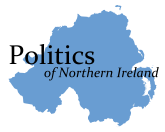- Cross-community vote
-
Northern Ireland 
This article is part of the series:
Politics and government of
Northern IrelandNorthern Irish LawNI in the UKNI in the EU
A cross-community vote or cross-community support is a form of voting used in the Northern Ireland Assembly according to the provisions of the 1998 Belfast Agreement.[1] It requires the support of both communities in Northern Ireland, in other words majority of unionists and the majority of nationalist members of the Assembly.[2] It is also used to a lesser extent at local government level.[citation needed]
Contents
Background
Upon taking their seats members of the Northern Ireland Assembly are required to designate themselves as either "unionist", "nationalist" or "other". MLAs are free to designate themselves as they see fit, the only requirement being that no member may change his or her designation more than once during an Assembly session.[3]
A vote will not automatically require cross-community support. A "Petition of Concern" must first be presented to the Speaker by at least 30 of the 108 members. In a cross-community vote the majority of unionists and the majority of nationalist votes are required to pass a motion put to the Assembly.[4]
Designations
Designations 2011 2007 2003 1998 Unionist 56 54 59 58 Nationalist 43 44 42 42 Other 9 10 7 8 Note: These figures include the assumed designation of the Speaker who, having a non-partisan role, does not officially declare a designation.
Parties
List of current and previous assembly parties by designation.
Unionist
Democratic Unionist NI Unionist Progressive Unionist UK Unionist Ulster Unionist United Unionist Coalition Nationalist
Sinn Féin SDLP Other
Alliance Green (NI) NI Women's Coalition See also
References
- ^ Minority Veto Rights in Power Sharing Systems: Lessons from Macedonia, Northern Ireland and Belgium by Shane Kelleher
- ^ Section 3.7 - Standing Orders of the Northern Ireland Assembly - PDF file from the Assembly website.
- ^ Section 3 - Standing Orders of the Northern Ireland Assembly - PDF file from the Assembly website.
- ^ Section 27 - Standing Orders of the Northern Ireland Assembly - PDF file from the Assembly website.
External links
- Official website
- "The Nature of the British-Irish Agreement" by Brendan O´Leary
Northern Ireland Assembly Assembly 

Committees Office of the First Minister and deputy First Minister · Agriculture and Rural Development · Culture, Arts and Leisure · Education · Employment and Learning · Enterprise, Trade and Investment · Environment · Finance and Personnel · Health, Social Services and Public Safety · Regional Development · Social DevelopmentConstituencies Parties Elections Procedure Cross-community voteSee also Good Friday Agreement · St Andrews Agreement
Wikimedia Foundation. 2010.
